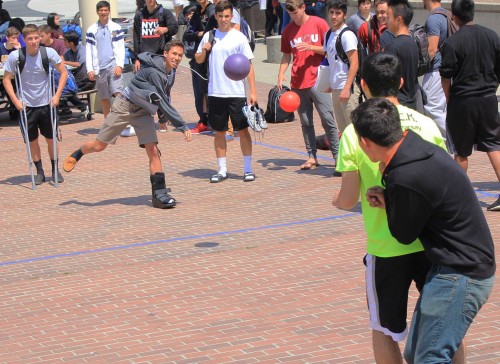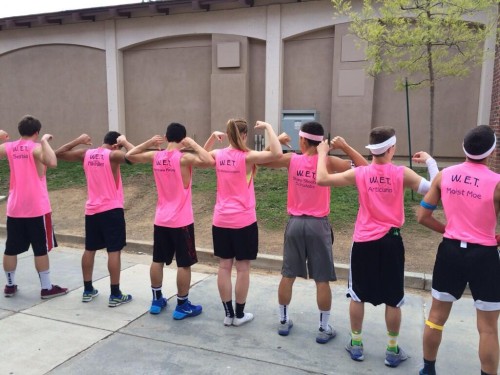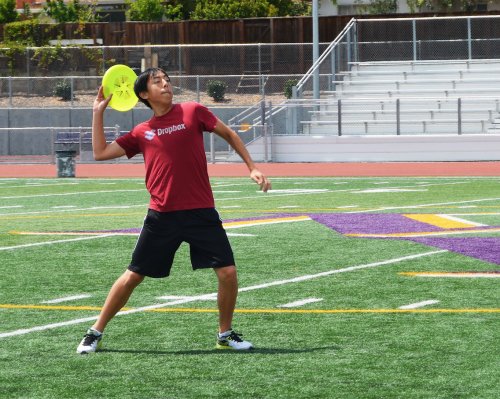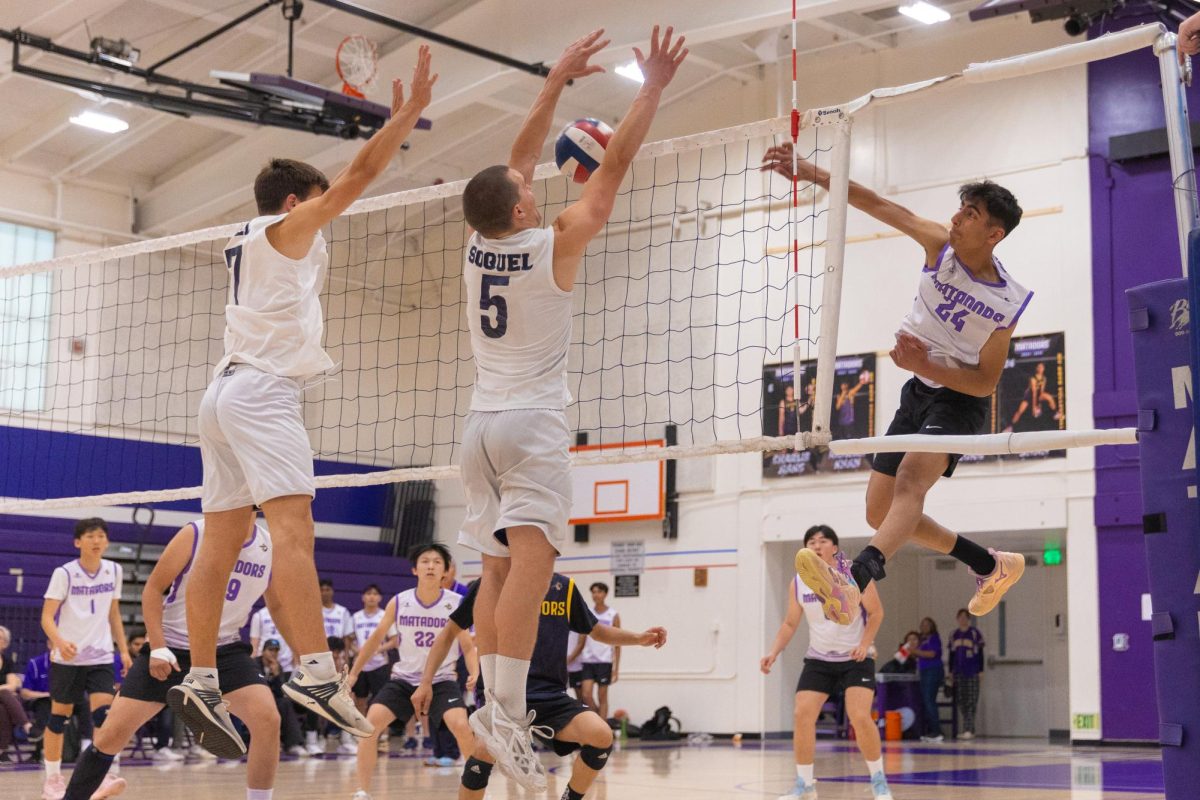enior Greg Moe plays two varsity sports, but the team he’s on with the closest friendships, sweetest victories and most bitter betrayals isn’t listed on the MVHS website. They didn’t need a physical to join and they’ll never qualify for CCS. Their practices are optional and sporadic, they frequently heckle other teams and their head coach is just the player with a neck injury, but they’re one of the most successful groups out there.
Team WET, along with a few other teams including Equivocation and Chang Dynasty, participate in multiple intramural sports, bouncing from basketball to frisbee, earning victories and facing devastating losses in between fifth and sixth period. These prominent faces on the intramural scene are seniors with free time to devote to their group of five or six, submitting rosters to the Facebook events that pop up promoting the latest tournament. This year, clubs organized their respective tournaments — Volleyball Club held a volleyball tournament earlier in the year and members of Monta Vista Ultimate Frisbee put together a spring frisbee tournament.
While some intramural participants are athletes, the fact that teams compete in multiple tournaments inherently means that players are often inexperienced, contributing to a spontaneous, low pressure atmosphere.
“It’s nice to play sports in a semi-competitive environment, especially when for our whole lives we’ve been playing sports very competitively,” Moe said.
The lack of experience also makes the good plays stand out.
“When we make amazing plays [on varsity volleyball], it’s not the same because we know that we can make amazing plays,” Equivocation senior Tejas Gopal said. “In intramural, when someone who doesn’t play basketball [does well], you go crazy because that’s not expected of them.”

Both teams attribute the increase in intramural popularity, at least in part, to club members organizing tournaments as opposed to Leadership students. Members of sports clubs are knowledgeable about rules and regulations, focused on their one event and above all, passionate about the sport they’re promoting.
“With clubs, they’re actually taking initiative,” Moe said. “They’re doing something they don’t necessarily have to by starting these intramural tournaments. They’re motivated to make it work out.”
Senior Young Guo planned intramural ultimate frisbee and ran into a few scheduling conflicts due to the increase of intramural tournaments at the end of the year, testing and spring break. Weeks after Guo reserved the upper field and found advisers to watch over the game, he found out that intramural dodgeball was scheduled for the same day, hurting the attendance and messing up the schedule for teams involved in both.
Despite this, the ultimate frisbee club still feels it successfully promoted its second annual tournament to inexperienced players. Members isolated themselves on different teams while Guo stuck to organizing the tournament and refereeing to avoid a conflict of interest. Guo noted that the past year’s winning team Vicious Delicious, Team WET’s corollary team, was not a group of frisbee players — they were just athletic.
“If you can run, if you can catch, if you can sort of throw, you’re alright,” Guo said. “Since intramural obviously is at a slightly lower level, there’s not going to be organized offense or defense, so you can get away with a lot more.”
The vastly different dynamic makes for games with constant laughter and light-hearted chanting, neither of which you would normally see at games for school sports.
“When you play soccer, everything’s on the line,” Equivocation senior Chatty Adiga said — before seeing his group’s skeptical faces and quickly adding that Equivocation games matter to him, too.
While in soccer, he plays with athletes who truly play the sport, but in intramural he and his friends have good chemistry, which empirically translates to success.
“We had a better record with Equivocation than we did on varsity soccer,” he said, laughing.
Equivocation formed the opposite way most intramural teams form — they picked a name and then decided what the team was for.
“It was a general purpose team,” senior Sid Girkar said. “It’s like the Astrodome.” This year, Equivocation made a conscious decision to participate in all intramural sports and even did Puzzle Hunt together in their final year on campus.
Team WET’s foray into multiple sports was less planned out — they signed up for volleyball impulsively, with only junior Sydney Howard and senior Hannah Pollek actually playing the sport.
“We already had uniforms and we really wanted to wear them as much as possible,” Moe said. The personalized neon pink bro tanks Pollek made with her mother stayed dry last year after WET was eliminated in their first game of intramural basketball.

After seeing an increase in the amount of intramural tournaments at MVHS, Badminton Club seniors Annie Wang and Justin Ma hosted intramural badminton.
“MVHS is known for its badminton team, and intramural lets us market the team [to MVHS],” Wang said, explaining that despite its accomplishments, the team is not widely recognized on campus.
Other club members turned intramural organizers expressed the same sentiment. Senior Sujay Gorti, president of Basketball Club, explained that intramural is the club’s main event and main source of recognition. Though in the past they had help from Leadership, the club decided to be more proactive and host the event independently this year.
In intramural basketball, as in nearly all intramural sports, the games are hosted by and dominated by upperclassmen: specifically, seniors. Some organizers cited the fact that seniors are bigger, faster and more athletic and some players noted that seniors simply have fewer responsibilities.
Ballislife, an all-freshmen intramural basketball team, attempted to shake the upperclassmen podium.
“We were nervous [because] all of the seniors were super good,” Ballislife member freshman Shiv Ansal said. “But then we got past first round and we thought we were super beast.”
Although Ballislife was eliminated in the second round, the team viewed their standing in the senior-dominated tournament as a success. In an organization filled with upperclassmen, little victories can go a long way.
There’s another reason seniors rule intramural — they want to make lasting memories during their last year, to move from spectators in the bleachers to participants on the court in their final stretch. As sports club members inherit different officer positions in their senior years, they inherit a tradition — organizing intramural sports to promote their club and provide low-stakes platforms for friendly competition.
At a round three ultimate frisbee game on April 21 between Chang Dynasty and the Schrodinger Stobies, Guo referees and laughs on the sideline. After a game of mild skirmishes over calls, chants from spectators and multiple Hail Marys, Chang Dynasty emerges victorious. Then the bell for sixth period rings, the students lumber on to class and wait for the next lunch period.








